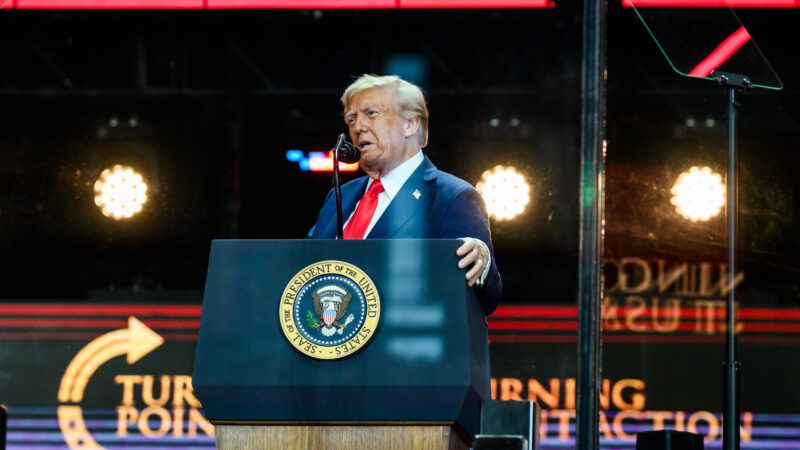Americans Shouldn't Be Governed by People Who Hate Half of Us
Political hostility is intensifying and most partisans believe the other side is made up of bullies.

At September's televised memorial service for Charlie Kirk, President Donald Trump commented on the conservative commentator's character, saying, "He did not hate his opponents; he wanted the best for them." He then added, "That's where I disagreed with Charlie. I hate my opponents. And I don't want the best for them."
Like too much of the political class across the ideological spectrum, Trump is prone to despising those he disagrees with. It raises questions about why people should ever submit to the governance of those who hate them—and whether politicians realize they're a big part of what brought us to this unfortunate moment.
"It's long past time for all Americans and the media to confront the fact that violence and murder are the tragic consequence of demonizing those with whom you disagree," Trump had told the nation on the day of Kirk's assassination, at a perhaps more self-aware moment. "This kind of rhetoric is directly responsible for the terrorism that we're seeing in our country today."
That same day, Trump also put the blame for Kirk's murder on "the radical left" and promised to "find each and every one of those who contributed to this atrocity and to other political violence," hinting at something nastier than a criminal investigation.
Villainizing and disrespecting opponents are routine for the political class. In a bizarre address to the nation in 2022, then-President Joe Biden said "MAGA Republicans do not respect the Constitution" and "fan the flames of political violence." He had already accused his opponents of "semifascism."
Kamala Harris dropped the "semi" as the Democratic presidential candidate in 2024 and described her opponent as a "fascist."
Trump and his allies regularly accuse their opponents of anti-Americanism—"I really believe they hate our country," Trump said in July. Trump's 2016 Democratic opponent, Hillary Clinton, dismissed her foes as a "basket of deplorables," characterizing them as "racist, sexist, homophobic, xenophobic, Islamophobic—you name it." As a presidential candidate in 2008, Barack Obama sniffed at many small-town dwellers as "bitter, they cling to guns or religion or antipathy to people who aren't like them."
No matter which of the big political parties wins national office, around half the people over whom the victors exercise power know they're governed by people who hate them—and they return the favor.
Among Americans, partisan hostility is intensifying. "About three-quarters (73 percent) of voters who identify themselves as Republican agree that 'Democrats are generally bullies who want to impose their political beliefs on those who disagree,'" a poll by the University of Chicago's Institute of Politics found in 2022. "An almost identical percentage of Democrats (74 percent) express that view of Republicans."
Maybe it was inevitable that a political culture that has normalized "demonizing those with whom you disagree," as Trump put it on the day of Kirk's murder, would turn to force to settle disputes. That has meant home invasions, arson, vehicle attacks, attempted assassinations, and murders, such as those of Yaron Lischinsky, Sarah Milgrim, Brian Thompson, Melissa Hortman, and Kirk.
Americans—people in general—should not be subject to the whims of those who despise them. We deserve better than to be governed by those who disdain what we believe and how we live.
For years, Americans have been moving to live in neighborhoods where they feel politically comfortable. "Our analysis suggests partisanship itself, intentional or not, plays a powerful role when Americans uproot and find a new home," Ronda Kaysen and Ethan Singer wrote in 2024 for The New York Times in a piece on Americans' moving patterns. "In all but three states that voted for Mr. Biden in 2020, more Democrats have moved in than Republicans. The reverse is true for states Mr. Trump won."
Instead of fighting with opponents for a brief opportunity to force policies on the unwilling before they do the same in return, perhaps our political class could turn its attention to those localities dominated by people willing to buy what they're selling. They could leave the rest of us alone to live by different rules. That was, after all, how our federal system was designed to work—as separate experiments in laws and governance.
This article originally appeared in print under the headline "Politicians Make Political Tensions Worse."


Show Comments (169)